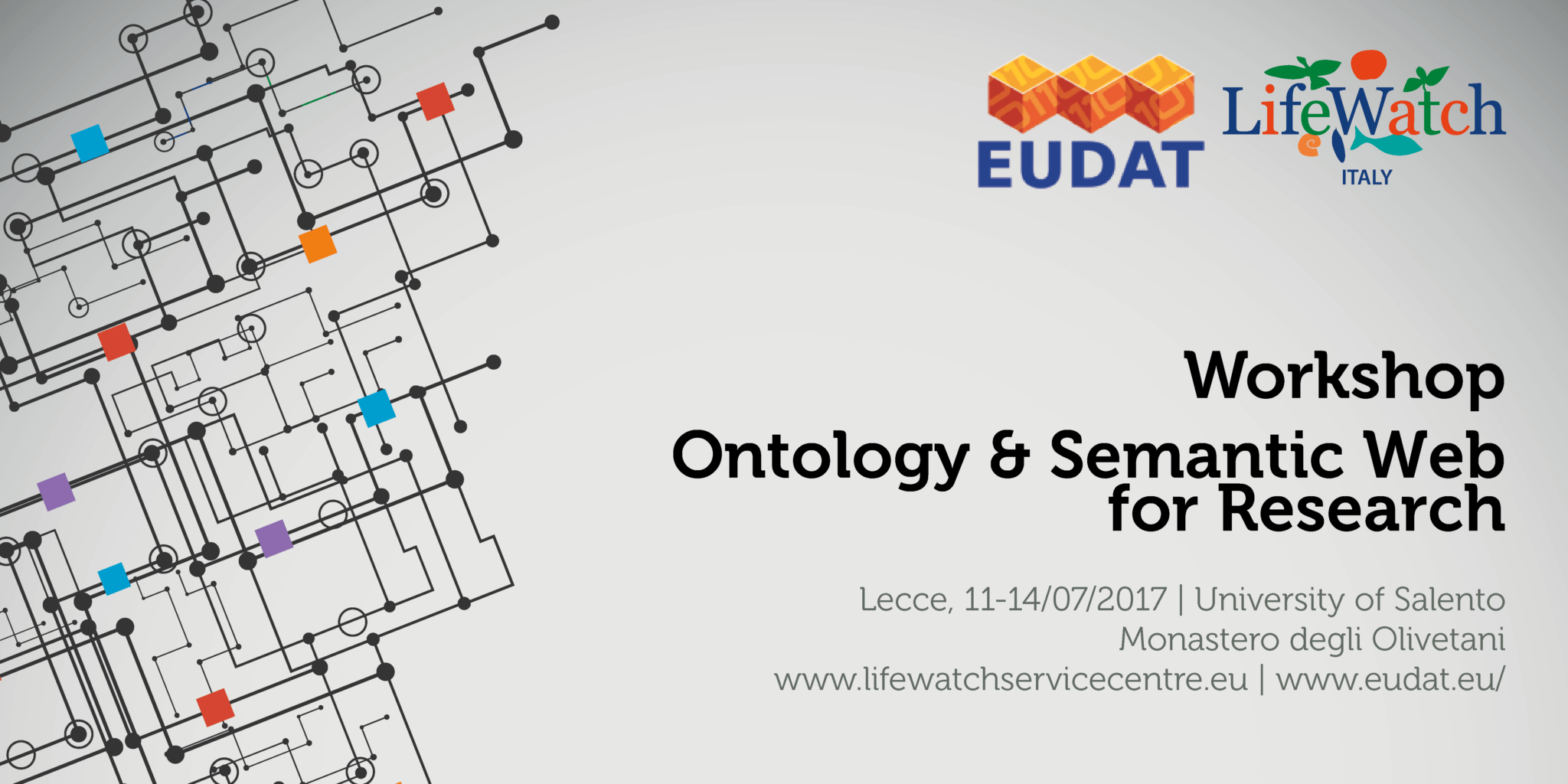Introduction
Biodiversity, as with many other scientific fields, relies on the integration of data from multiple sources and spanning multiple scales (spatial and temporal). As the volume of available data is increasing, several projects and infrastructures are developing services for better managing this information, making it accessible, available and reusable in order to develop new knowledge. Alongside this, community standards, tools, services and governance models were developed to facilitate data and system interoperability. A common strategy is to exploit semantic resources such as metadata, vocabularies and ontologies to support interoperability among emerging data infrastructures.
This workshop, resulting from the collaboration between the e-Biodiversity Research Institute of LifeWatch Italy, the Italian node of LifeWatch ERIC, and EUDAT, the pan-European Collaborative Data Infrastructure, was a time to discuss common approaches, tools and existing solutions, not only for biodiversity communities but also for as many scientific domains as possible.
A number of initiatives have already been organised to discuss good practices for semantic resource development, interoperability and discoverability, and the definition of authoritative tools and facilities for the scientific community, such as the LifeWatch Italy Workshop “Thesauri & Semantics in the Ecological Domain” and the EUDAT workshop in Barcelona.
Programme
Tuesday 11 July 2017
Usages of semantic resources in Research Infrastructures (RIs)
14:00-14:10 Welcome (A. Basset, LifeWatch Italy; Y. Le Franc, EUDAT)
14:10-14:30 General Introduction to the topic (chair: P. Tagliolato, LifeWatch Italy)
14:30-16:00 Experiences from different RIs and projects:
Talks
- Semantics for the Analysis and Experimentation on (continental) Ecosystems: AnaEE (C. Pichot, INRA)
- Terminology Supported Data Archiving and Publication in PANGAEA (M. Stocker, University of Bremen)
- Semantic Resources in LifeWatch Italy (I.Rosati & C. Bergami, LifeWatch Italy)
- Semantic Data Management in the AquaDiva Project (F. Klan, Friedrich-Schiller-University Jena)
- Semantic monitoring data process description in LTER within SERONTO and EnvThes (B.Magagna, LTER)
- The Vi-SEEM e-Infrastructure project (V. Vassallo, The Cyprus Institute)
16:00-16:30 Coffee Break
16:30-18:30 Final discussion and next steps (report, review paper, recommendations) (chair: P. Tagliolato, LifeWatch Italy)
Wednesday 12 July 2017
Alignment of vocabularies and ontologies & Comparison among vocabulary governances
09:15-09:35 General Introduction to the topic (chairs: N. Fiore, LifeWatch Italy; B. Magagna, Environmental Agency Austria; S. Cox, CSIRO Australia)
09:35-11:00 Experiences from different groups, projects and RIs:
Talks
- From O&M to observable properties (S. Cox, CSIRO Australia)
- Observable characteristics – existing approaches and arising problems in EnvThes and other related vocabularies (B.Magagna, LTER)
- Alignment of the AnaEE thesaurus, and ontology (C. Pichot et al., INRA)
- Bridging multiple domains through an environment ontology: the value of continuous semantic interoperation and collaborative development (P. Buttigieg, Alfred-Wegener-Institut, Helmholtz-Zentrum für Polar- und Meeresforschung)
- The LifeWatch Italy semantic approach (N. Fiore, LifeWatch Italy)
11:00-11:20 Coffee Break
11:20-13:00 Final discussion and next steps (report, review paper, recommendations) (chairs: N. Fiore, B.Magagna, S. Cox)
13:00-14:30 Lunch Break
Semantic discoverability and interoperability
14:30-14:50 General Introduction to the topic (chair: Y. Le Franc)
14:50-16:05 Experiences from different groups, projects and RIs:
Talks
- Semantic interoperability of marine sensor data and metadata: A use case for the ESONET yellow pages and FixO3 observatories (M. Stocker, University of Bremen)
- Experiences and Challenges on Semantic Discoverability in Health Data Analytics (Oya Beyan, RTWH Aachen University)
- Overview on repositories, ontology lookup services, comparisons, pros and cons, similar (D. Goldfarb, LTER)
- Interoperability and discovery of AnaEE distributed resources through semantic annotations (C. Pichot, INRA)
16:05-16: 25 Coffee Break
16:25-18:00 Final discussion and next steps (report, review paper, recommendations) (chair: Y. Le Franc)
20:30 Social Dinner at the Must – Historical Museum of the City of Lecce.
Thursday 13 July 2017
Services for semantics
9:15-9:35 General Introduction to the topic (chair: A. Oggioni, LifeWatch Italy)
9:35-11:00 Experiences from different RIs and projects:
Talks
Selecting and Customising Ontologies with JOYCE (F. Klan, Friedrich-Schiller-University Jena)
- The GFBio Terminology Service – a unified interface for accessing heterogeneous terminological knowledge (N. Karam, Freie Universität Berlin)
- Semantic enablement of geospatial metadata: Going full circle (C. Fugazza, IREA – CNR)
- WordNets for Modelling Word Meaning in Linguistics and Cognitive Psychology Research and The CLARIN Concept Registry (E. Hinrichs, CLARIN Research Infrastructure)
- Open information linking across environmental research infrastructures (P. Martin, University of Amsterdam; ENVRIplus project)
- IndexMeed consortium for data mining in ecology: How to build graphs and mine heterogeneous data for environmental research? (Romain David, IMBE – CNRS)
11:00-11:20 Coffee Break
11:20-13:00 Final discussion and next steps (report, review paper, recommendations) (chair: A. Oggioni)
13:00-14:30 Lunch Break
14:30-16:00 Working Groups for each topic
16:00-16:20 Coffee Break
16:20-18:00 Working Groups for each topic
Friday 14 July 2017
9:15-11:00 Working Groups for each topic
11:00-11:20 Coffee Break
11:20-13:00 Plenary Working Groups
13:00-13:30 Workshop closure and departure
